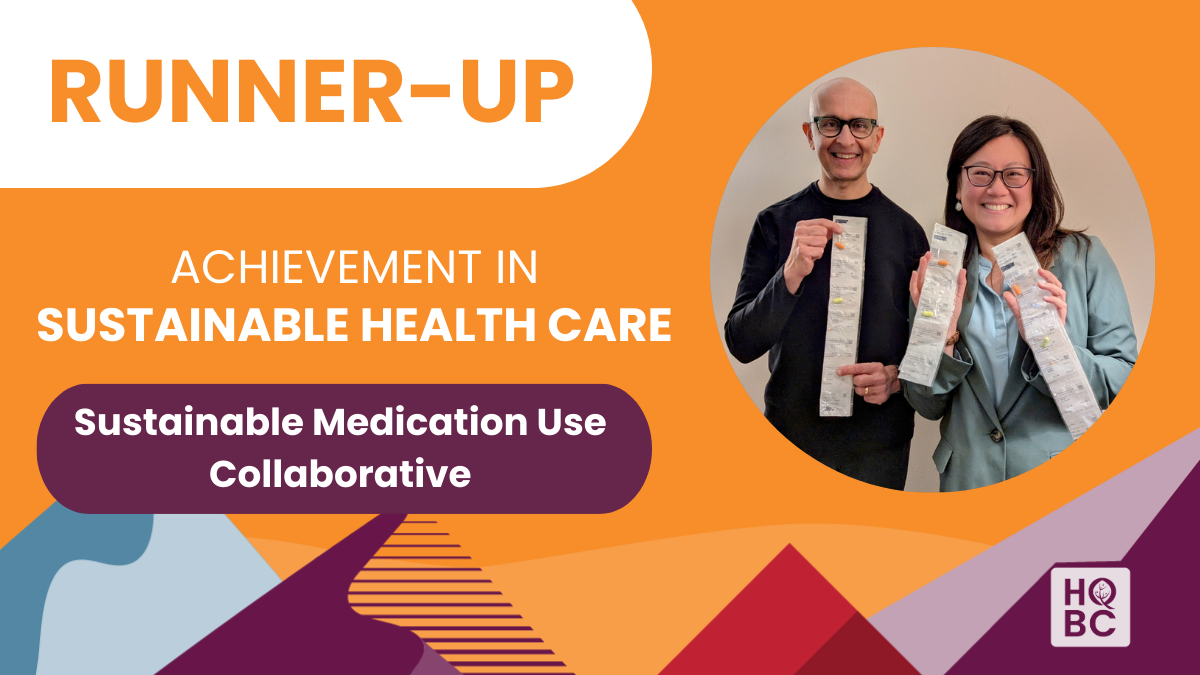- 2025
|
- Runner-Up
|
- Achievement in Sustainable Health Care
Gigi Wong and the Fraser Health Medication Use Evaluation (FH MUE) team, which includes Aaron M Tejani, Isla Drummond, Elissa Aeng, Alfie Chung and Deborah Heidary, have committed to various endeavours related to supporting environmentally sustainable clinical care focusing on things that can be done in their sphere of influence in Fraser Health. Most recent is looking at waste and opportunities to reduce preventable medication waste in the inpatient hospital systems.
The current focus area is on reducing pharmaceutical waste by testing a change idea to address an ongoing barrier to sorting reusable medications back into circulation for re-dispense instead of being discarded and incinerated – a shift from a linear cycle to one that is more circular, in alignment with sustainability. This work directly ties to the efficiency of our health system while ensuring patient safety is at the heart of this work.
Gigi has spent years exploring and documenting inpatient hospital medication waste. Her colleagues in the FH MUE team had looked at the financially favourability and viability of sorting medication returns for reuse in 21 hospitals in Metro Vancouver and found that about 500,000 doses of medication are returned every year, with more than 50% of this being incinerated. She also used students to return unused medication to inventory at three sites and determined that hundreds of thousands of dollars can be saved by recycling the returned medications even after students are paid to do the work.
Building on many years of work and efforts, in spring 2024, Aaron, Isla, Gigi and Alfie tested a change idea to address an ongoing barrier where site pharmacy staff were getting pulled to other priority duties, leaving other staff to process returns amid their other work. The change proposed a model where a designated regional staff person that cannot be summoned by the site for site priorities was to rotate between hospitals and focus only on returning safe, unused medications to inventory to be reused by other patients – an intervention that had never been tried before. In the preliminary data from February to April 2024 that encompassed two sites in Fraser Health, the cost of labour for this regional staff person was $2,831, while the medication cost recovered from being wasted was $22,914 with a net savings of $20,084. The net savings was $239 for every hour of labour – equating to $8 recovered for every $1 invested in labour.
From a financial perspective, this underestimates the savings to the system because it excludes other costs associated with repurchasing medications (sourcing, ordering, shipping, receiving, making unit-dose packages from bulk bottles and equipment maintenance). The pilot test of the change idea therefore resolved both concerns, namely limited human resources available to pharmacy departments and to know if it would be financially viable.
From a sustainability perspective, reusing medications offers several benefits. First, it reduces pharmaceutical waste and the subsequent incineration including packaging and disposal costs, all of which have negative impacts on the environment. Second, by minimizing the repurchasing of medications, emissions are lowered across health care operations, contributing to reduced global temperature rise. Third, increasing awareness of life cycle assessments highlights the significant resources required for the active ingredients, excipients, and device components like metals and plastics.
“I wasn’t aware of the impact pharmaceuticals have on the environment and wildlife, nor did I pay attention to how my work in the Pharmacy was leading to unintentional harm on the planet until I heard Gigi describe this in various Provincial Pharmacy conferences and workshops. This awareness has prompted me to work with Aaron on local sustainable health projects such as an initiative to re-dispense medications that would have otherwise gone to waste resulting in lost health care dollars and further harming the planet. I have Aaron and Gigi to thank for guiding me”, said Ray Jang, Pharmacist and Manager for Fraser Health, Lower Mainland Pharmacy Services.
There is potential to scale this pilot project across the health authorities in the Lower Mainland – there are 25-plus hospitals in the scope of the consolidated Lower Mainland Pharmacy Services that encompasses four local health authorities (Fraser Health, Providence Health, Provincial Health Services Authority, and Vancouver Coastal Health).
In addition, Gigi and the FH MUE team have pursued and led other projects to green hospital pharmacy with other colleagues in the health authority and beyond. Gigi has explored situations where pharmacy waste has been observed and is part of the Canadian Society of Hospital Pharmacists National Sustainability Task Force, and part of the Fraser Health Planetary Health Stewardship Committee, as well as presented nationally as part of the Canadian Coalition for Green Healthcare and with CASCADES Canada. Aaron, Isla, Alfie and Elissa have quantified inhaler waste in hospitals and developed and successfully implemented interventions to reduce this waste while saving money.


